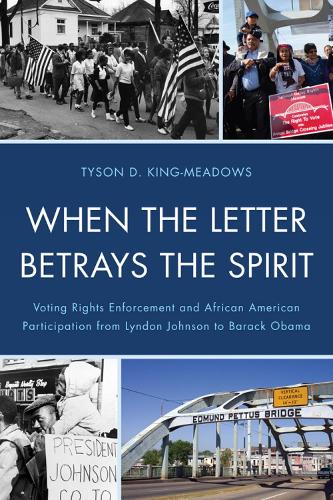
When the Letter Betrays the Spirit: Voting Rights Enforcement and African American Participation from Lyndon Johnson to Barack Obama
(Paperback)
Publishing Details
When the Letter Betrays the Spirit: Voting Rights Enforcement and African American Participation from Lyndon Johnson to Barack Obama
By (Author) Tyson D. King-Meadows
Bloomsbury Publishing PLC
Lexington Books
18th August 2011
United States
Classifications
General
Non Fiction
Ethnic studies / Ethnicity
324.6208996073
Physical Properties
Paperback
374
Width 156mm, Height 232mm, Spine 22mm
567g
Description
When the Letter Betrays the Spirit examines the wide latitude provided to the executive branch and to the Supreme Court by the text of the Voting Rights Act of 1965. Drawing from government enforcement data, legislative history, Supreme Court rulings, the 2006 reauthorization debate on the VRA, and from the 2007 scandal involving the firing of U.S. attorneys under the Bush Administration, the book examines when, why, and how executive and judicial discretion facilitates violation of voting rights. Connecting Johnson to Obama, the book outlines why the executive-centered model of voting rights enforcement relegates Congress to the sidelines, and outlines why a Congress-centered approach provides the best protection against the effects of the law enforcement axiom: the law is neither self-executing nor self-interpreting. The book also examines 2008 survey results about public support for a Jim Crow-era election reform policy that would require voters to read a passage of the Constitution. Describing the civic literacy dimensions of voting rights law from Shaw v. Reno (1993) to Northwest Austin Utility v. Holder (2009), the book highlights the complicated nature of the post-racial rhetoric surrounding the 2008 election cycle and surrounding the upcoming post-2010 census redistricting cycles.
Reviews
King-Meadows does an outstanding job of advancing an inherently difficult proposition-a Congress-Centered approach to voting rights enforcement. Because he is so meticulous in analyzing the many practical implications of our current Executive-Centered Framework, and does it using many different kinds of evidence, his book will be of great interest to scholars who study African American politics, voting rights and civil rights policy, political representation, as well as public policy implementation. -- Todd Shaw, University of South Carolina
Professor Tyson King-Meadows has produced an exceptionally brilliant and timely piece of scholarship on the state and status of the 1965 Voting Rights Act and its four renewals. This comprehensive and systematic work takes the reader from President LBJ to President Barack Obama via King-Meadows's original conceptualization the "Johnson Framework" through the Conservative Movement and its presidents along with the U.S. Commission on Civil Rights efforts to redirect and reorient the focus and implementation of VRA as a different public policy. The intellectual sweep of this work encompasses not only the executive, but the legislative, judicial, and bureaucratic branches of government. This culminates in a bold new theory that is generated from both quantitative and qualitative data. Rare scholarship is on display in every chapter of this book. -- Hanes Walton Jr.
Tyson King-Meadows provides an exhaustive examination of the Voting Rights Act, including its adoption, interpretation, implementation, and revision. His focus is on the enormous discretion that presidents, justices, and Congress have had, and continue to have, in decisions concerning the Act, discretion that can be employed to strengthen or weaken the impact of the Act on minority empowerment. Anyone interested in the role that this Act plays in American politics will learn a great deal from this book, including those who think they are already well versed in the Act and its consequences. -- Richard L. Engstrom, Duke University
The 1965 Voting Rights Act (VRA) is considered the crowning achievement of the American civil rights movement in the effort to secure equal rights for African Americans. While impressive gains have been made in terms of black voter registration and election turnout, King-Meadows (Univ. of Maryland, Baltimore County) contends that the act's enforcement has been mercurial, contingent upon the political inclinations of whoever is currently president. The reason for this is the subject of this book. The author argues that the structure of the VRA was devised by Lyndon Johnson, placing significant moral and political faith in the president to support voting rights. This faith came at the expense of congressional oversight and legislation that could have limited that discretion, compelling presidents, regardless of who it is, to enforce minority voting rights. Despite several reauthorizations of the VRA since 1965, the Johnson framework remains in place, limiting the effectiveness of the act. The book offers good analysis of the various congressional VRA debates, studies in presidential nonsupport, and observations on where the future of minority voting rights enforcement is headed under Obama and future presidents. Good for collections on civil rights, voting rights, and presidential power. Summing Up: Recommended. * Choice Reviews *
Author Bio
Tyson D. King-Meadows is assistant professor of political science at the University of Maryland, Baltimore County.
